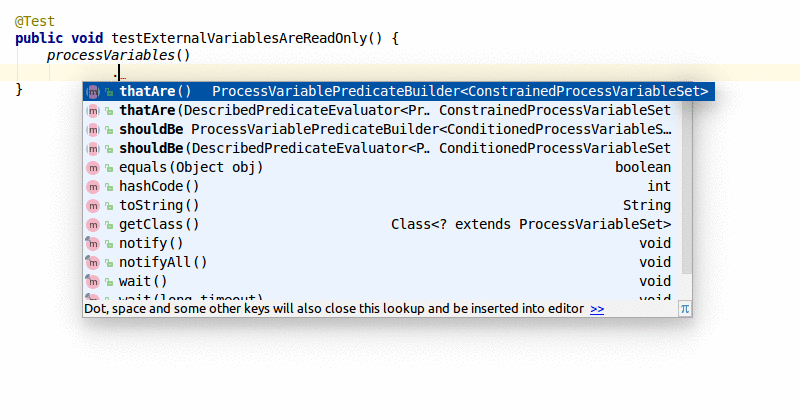Data Flow Validation Language
The data flow validation language is a DSL embedded in Java and provides functionality for defining data flow rules and automated validating against process applications.
Language Design
On a high-level, the language consists of five elements:
- Process variables containing operations and all relevant information, e.g. location and type.
- Constraints for filtering the set of process variables of a process application, that are subjects to a rule.
- Conditions defining properties of process variable that need to be complied to.
- Reasons provide the opportunity to convey the intention behin a rule.
- Criticality defines whether a violation leads to an error or just warnings/information.
Example Rules
The first of the following example is animated to demonstrate the use of auto-complete aiding in the definition of rules. The subsequent example show common use cases for defining DFVL rules.
Read-only variables for external data

Prevent writes at sequences flows
DataFlowRule rule = processVariables()
.shouldBe().not().written().byModelElements().ofType(SequenceFlow.class);
Prevent access by elments without necessary properties
Collection<String> blacklist = Arrays.asList(".*[eE]mail.*", ".*[cC]ustomer.*",
".*[cC]ontract.*", ".*bank[aA]ccount.*", ".*[pP]olicy.*");
ConstrainedProcessVariableSet filteredVariables = null;
for (String pattern : blacklist) {
if (filteredVariables == null)
filteredVariables = processVariables().thatAre().matching(pattern);
else
filteredVariables = filteredVariables.orThatAre().matching(pattern);
}
DataFlowRule rule = filteredVariables
.shouldBe().read().onlyByModelElements().withProperty("securityAudited")
.because("personal data is only allowed to be read at security audited elements");
Custom DFVL Rules
Next to using the provided language constructs to define rules, it is also possible to define custom constraints and predicates:
DataFlowRule rule = processVariables().thatAre().prefixed("ext_")
.shouldBe(
new DescribedPredicateEvaluator<ProcessVariable>(
v -> new EvaluationResult<ProcessVariable>(
v.getWrites().size() <= 1,
v,
String.valueOf(v.getWrites().size())
), "written at most once"
)
)
.because("external data should not be overwritten");
Execution
Data flow rules can either be executed as part of the vPAV workflow with the DataFlowChecker or as separate unit test.
The following snippet shows an exemplary setup for evaluating rules as unit tests:
@RunWith(SpringJUnit4ClassRunner.class)
@ContextConfiguration(classes = { SpringTestConfig.class })
public class DataFlowRulesTest {
private Collection<ProcessVariable> processVariables;
@Autowired
ApplicationContext ctx;
@Before
public void parseProcessVariables() {
File modelFile = new File("src/main/resources/KfzGlasbruch.bpmn");
processVariables = ProcessApplicationVariableParser
.parseProcessVariables(modelFile, ctx);
}
@Test
public void testExternalVariables() {
processVariables().thatAre().prefixed("ext_")
.shouldBe().written().atMost(1)
.because("external data should not be overwritten")
.check(processVariables);
}
}
A call to the .check() method of DataFlowRule implicitly makes a JUnit assertion and throws an AssertionError in case of any violations, which includes rule description and violation messages as part of its message:
java.lang.AssertionError: Rule 'Process variablesthat are prefixed with 'ext_' should be written at most 1 time because external data should not be overwritten' was violated 1 times [Criticality: ERROR]:
'ext_damageClaim' needed to be written at most 1 time but was 2